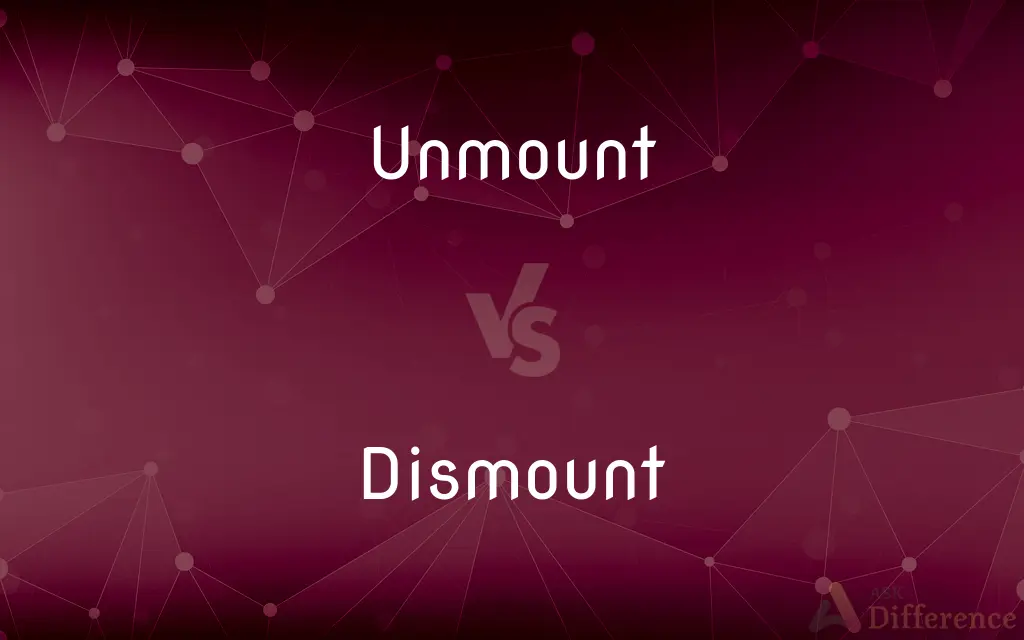Unmount vs. Dismount — What's the Difference?
By Urooj Arif & Maham Liaqat — Updated on February 28, 2024
Unmount involves detaching a device or storage medium from a computer system, while dismount refers to the act of getting off a vehicle, horse, or bicycle.

Difference Between Unmount and Dismount
Table of Contents
ADVERTISEMENT
Key Differences
Unmount is primarily used in the context of computer systems, where it signifies the process of safely detaching a storage device, ensuring no data loss. Dismount, on the other hand, is used in physical activities, describing the action of getting down from a horse, bicycle, or vehicle.
Unmounting is a technical action, involving software operations to ensure that a device can be safely removed without corrupting data. Dismounting is a physical action, involving a person physically separating themselves from an object or vehicle.
The safety implications of unmounting relate to data integrity and the prevention of data loss. For dismounting, safety concerns focus on the physical well-being of the person getting off the vehicle or animal, preventing falls or injuries.
Unmounting is a procedure that may involve a series of software commands or clicks within a computer's interface. Dismounting is a process that involves physical movement and, in some cases, a technique to ensure safety, especially when dismounting from a high or moving object.
Unmount is almost exclusively used in the context of computing and data management, dismount finds its application in a variety of physical activities, from equestrianism to cycling and gymnastics, highlighting its broader usage in everyday language.
ADVERTISEMENT
Comparison Chart
Definition
Detaching a storage device or medium from a computer system.
Getting off a vehicle, horse, or bicycle.
Context
Computing and technology.
Physical activities, transportation, and sports.
Action Type
Technical software operation.
Physical movement.
Safety Concerns
Data integrity and prevention of data loss.
Physical well-being and prevention of injury.
Application Scope
Exclusive to computing.
Broad, covering various activities.
Compare with Definitions
Unmount
To safely disconnect a storage device from a computer.
Always unmount your USB drive before removing it.
Dismount
To exit a vehicle.
He dismounted the tank to survey the area.
Unmount
To detach a mounted file system.
The technician unmounted the disk before performing maintenance.
Dismount
To descend from a position.
The gymnast dismounted from the parallel bars with a perfect landing.
Unmount
To make a storage device inaccessible to the operating system.
He unmounted the external hard drive after backup.
Dismount
To detach or remove something.
Dismount the shelf from the wall carefully.
Unmount
To remove a device from its operational environment.
Unmount the virtual disk to prevent data corruption.
Dismount
To get off a horse.
The rider dismounted gracefully after the show.
Unmount
To cease the use of an attached device.
You must unmount the camera before disconnecting it.
Dismount
To step down from a bicycle.
She dismounted her bike at the stop sign.
Unmount
To reverse a mount operation; to instruct the operating system that the file system should be disassociated from its mount point, making it no longer accessible.
Dismount
To get down from a horse or other steed.
Dismount
To step off or down from
Dismounted from the cart.
Dismounted from the stool.
Dismount
(Sports) To execute a dismount in gymnastics.
Dismount
To alight from a horse; to descend or get off, as a rider from his beast; as, the troops dismounted.
Dismount
To throw or remove from a horse; to unhorse; as, the soldier dismounted his adversary.
Common Curiosities
Is it necessary to "unmount" a device before removing it?
Yes, to prevent data loss or corruption, it's advisable to properly unmount a device before physically disconnecting it.
Can "unmount" be used outside of computing?
Typically, "unmount" is specific to computing contexts and is rarely used outside of them.
Can you "dismount" a storage device from a computer?
The correct term is "unmount" when referring to safely disconnecting storage devices from a computer.
Is technical knowledge required to unmount a device?
Basic understanding of the operating system's interface is usually sufficient for unmounting devices.
Is "dismount" applicable to exiting cars or other vehicles?
Yes, "dismount" can be used for getting off or out of any vehicle, not just horses or bicycles.
Are there safety procedures for dismounting?
Yes, especially in sports or equestrianism, specific techniques and safety procedures are recommended to prevent injury.
Do all operating systems use the term "unmount"?
Most do, but terminology can vary slightly, with some using terms like "safely remove hardware."
What's the difference between "eject" and "unmount"?
"Eject" often refers to the physical process of removing a device, while "unmount" is the prior software process ensuring data safety.
Can "dismount" refer to removing parts or attachments?
While less common, "dismount" can refer to the act of taking apart or removing attachments from a larger object.
How do athletes learn to dismount safely?
Through training and practice under supervision to master the technique and minimize the risk of injury.
Why is dismounting important in gymnastics?
The dismount is a critical component of a routine, affecting scoring based on technique and execution.
Is there a difference between dismounting and getting off?
"Dismounting" often implies a more deliberate and controlled action, especially in sports or equestrian contexts, whereas "getting off" is more general and casual.
What happens if you don't unmount a device properly?
Improperly unmounting a device can lead to data corruption or loss.
Can "unmount" be automatic?
Some systems automatically unmount a device after a period of inactivity or during shutdown.
Can dismounting be dangerous?
Yes, especially from a moving vehicle or animal, incorrect dismounting can lead to falls and injuries.
Share Your Discovery

Previous Comparison
Medial vs. Mesial
Next Comparison
Doubt vs. QuestionAuthor Spotlight
Written by
Urooj ArifUrooj is a skilled content writer at Ask Difference, known for her exceptional ability to simplify complex topics into engaging and informative content. With a passion for research and a flair for clear, concise writing, she consistently delivers articles that resonate with our diverse audience.
Co-written by
Maham Liaqat













































